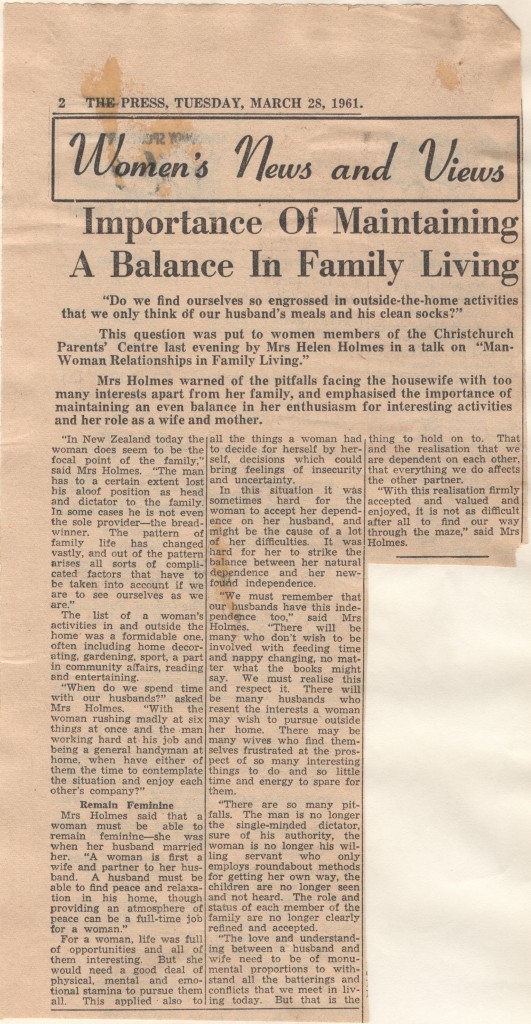Women’s Lives in 1960s New Zealand
New Zealand social mores were clear when I was growing up in the 1940s and ‘50s: a woman’s place was in the home, taking care of husband and children. A few women (like my mother-in-law) worked after they had children, but the job options were few.
The staff at Christchurch’s The Press newspaper was overwhelmingly male. When I started in 1960, there was only one other woman reporter, besides myself, in the general reporting pool. A vacancy occurred in the Women’s Department, secluded in a separate little office down the hall. The other woman reporter, older and wiser about gender issues, adamantly refused to take it. I didn’t want to go either. I was having a ball scouring the big city hotels for interesting overseas visitors, interviewing artists, musicians and others with fascinating careers and histories. But I was not given a choice. Fortunately the women’s page editor, Tui Thomas, was sympathetic to my lack of interest in fashion and the social scene, and set me to reporting on meetings of various organizations focused on women and families.
I cringed when I first re-read this clipping from my scrapbook, with its sexist stereotypes. Looking more carefully, I sense the speaker’s unease. By the early 1960s, change was in the air. I don’t remember who Mrs Holmes was, but I imagine her as an older woman struggling to reconcile traditional values with the emerging demand by a younger generation of women for an expanded role in the world outside the home. I’ve appended a transcription, in case you have trouble reading the old newsprint.
Maureen is exploring the contents of an old black filing cabinet in her attic, which contains 55 years of her writing notes and memorabilia.
The Press, March 28, 1961 (transcription)
Importance of Maintaining a Balance in Family Life
“Do we find ourselves so engrossed in outside-the-home activities that we only think of our husband’s meals and his clean socks?”
This question was put to women members of the Christchurch Parents’ Centre last evening by Mrs Helen Holmes in a talk on “Man-Woman Relationships in Family Living.”
Mrs Holmes warned of the pitfalls facing the housewife with too many interests apart from her family, and emphasized the importance of maintaining an even balance in her enthusiasm for interesting activities and her role as a wife and mother.
“In New Zealand today the woman does seem to be the focal point of the family,” said Mrs Holmes. “The man has to a certain extent lost his aloof position as head and dictator to the family. In some cases he is not even the sole provider—the breadwinner. The pattern of family life has changed vastly, and out of the pattern arises all sorts of complicated factors that have to be taken into account if we are to see ourselves as we are.”
The list of a woman’s activities in and outside the home was a formidable one, often including home decorating, gardening, sport, a part in community affairs, reading and entertaining.
“When do we spend time with our husbands?” asked Mrs Homes. “With the woman rushing madly at six things at once and the man working hard at his job and being a general handyman at home, when have either of them the time to contemplate the situation and enjoy each other’s company?”
Mrs Holmes said that a woman must be able to remain feminine—as she was when her husband married her. “A woman is first a wife and partner to her husband. A husband must be able to find peace and relaxation in his home, though providing an atmosphere of peace can be a full-time job for a woman.”
For a woman, life was full of opportunities and all of them interesting. But she would need a good deal of physical, mental and emotional stamina to pursue them all. This applied also to all the things a woman had to decide for herself, by herself, decisions which could bring feelings of insecurity and uncertainty.
In this situation, it was sometimes hard for the woman to accept her dependence on her husband, and might be the cause of a lot of her difficulties. It was hard for her to strike the balance between her natural dependence and her new-found independence.
“We must remember that our husbands have this independence too,” said Mrs Holmes. “There will be many who don’t wish to be involved with feeding time and nappy changing, no matter what the books might say. We must realize this and respect it. There will be many husbands who resent the interests a woman may wish to pursue outside her home. there may be many wives who find themselves frustrated at the prospect of so many interesting things to do and so little time and energy to spare for them.
“There are so many pitfalls. The man is no longer the single-minded dictator, sure of his authority, the woman is no longer his willing servant who only employs roundabout methods for getting her own way, the children are no longer seen and not heard. The role and status of each member of the family are no longer clearly defined and accepted.


No need to cringe. Mrs. Holmes was trying her best to give some advice to the harried, newly independent, and suddenly self conscious married woman: conscious that she too is a person and has a future other than motherhood and submission to the husband. Mrs. H., teetering herself on the edge of a new wave of Feminism, deserves our compassion for trying to keep wives focused on the tender sensibilities of their over-worked husbands, while they themselves are overwhelmed with the (unrecognized) work of keeping the marriage functional.
Do you remember the Burt Bacharach song below? It was a big hit, an effort to remind us girls not to get too caught up in our own stuff.
Hey, little girl,
Comb your hair, fix your make-up.
Soon he will open the door.
Don’t think because
There’s a ring on your finger,
You needn’t try any more
For wives should always be lovers, too.
Run to his arms the moment he comes home to you.
I’m warning you.
Day after day,
There are girls at the office,
And men will always be men.
Don’t send him off
With your hair still in curlers.
You may not see him again.
For wives should always be lovers, too.
Run to his arms the moment he comes home to you.
He’s almost here.
Hey, little girl
Better wear something pretty,
Something you’d wear to go to the city.
And dim all the lights,
Pour the wine, start the music.
Time to get ready for love.
Dim all the lights,
Pour the wine, start the music.
Time to get ready for love.
Time to get ready, time to get ready for love.
Time to get ready, time to get ready for love.